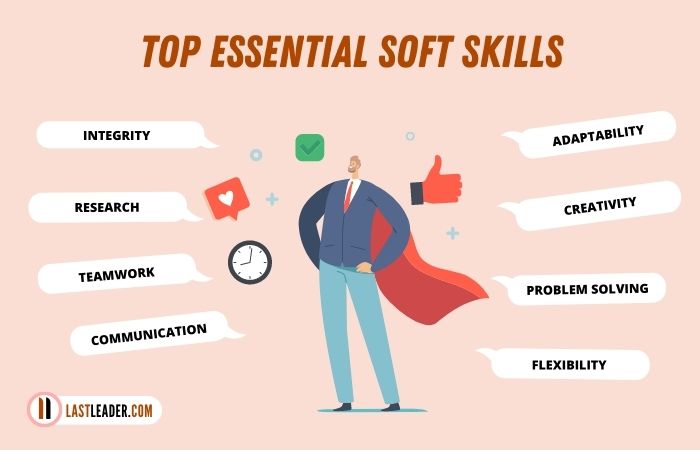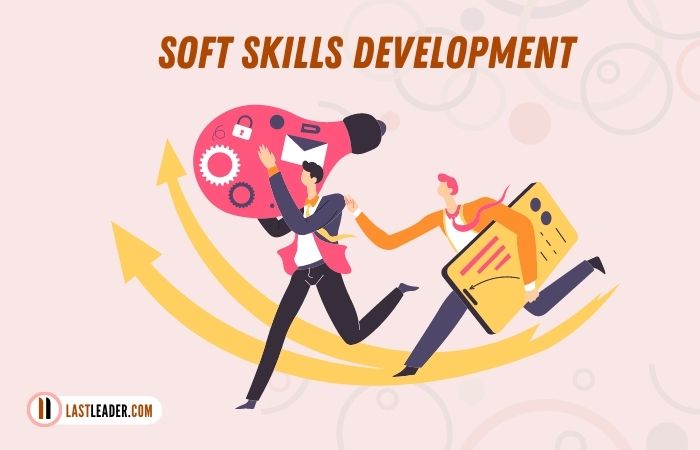What Are Soft Skills?
Soft skills are not technical skills but are relevant to how you conduct your work. They cover how you communicate with your coworkers, the way you resolve problems, and how to manage your time.
Soft skill definition:
Soft skills are personality traits that define an individual’s interactions with others.
When it comes to working, soft skills are considered an addition in the absence of hard skills and pertain to knowledge and skills in the workplace.
Soft skills are more in line with the person they are instead of what they know. In this way, they are the traits of character that determine how people interact and are usually a significant element of one’s personality. In a highly competitive job market, those who show they can demonstrate a potent mix of soft and hard skills are more likely to demand their products and services.
What are examples of soft skills?
There are a variety of essential soft skills that are essential. Problem-solving, communication, and time management are some examples of soft skills.

Types of soft skills:
Soft skills can be of different types; it’s unnecessary to hold all soft skills to succeed in life or a job. For instance, an instructor at a business school might have the soft skills of coaching, teaching, and guiding students. Someone else may possess the soft skills they need to sell their products by interacting with customers and being attentive to meet their needs in all aspects.
Some examples and types of soft skills:
- Effective communication skills
- Teamwork
- Dependability
- Adaptability
- Conflict resolution
- Flexibility
- Leadership
- Problem-solving
- Research
- Creativity
- Work ethic
- Integrity
List of soft skills:
Since soft skills are typically inherent to your personality, You already have a variety of valuable soft skills that can aid you in becoming successful at your job. Although your personality shapes most skills, these abilities can also be acquired and developed through practice and knowledge.
Here is a list of soft skills and how these abilities can help you perform better throughout and after the process of job searching and in life.
Communication
In the soft skill list, communication comes at the number 1 position. Communication soft skills can be beneficial during the interview process and your professional career.
Communication is among the most crucial soft skills, no matter the organization’s size. If employees can communicate effectively, they’ll be able to achieve goals. Things like meeting deadlines, assigning tasks, and communicating with customers are facilitated through solid communication skills, making it among the essential soft skills employees could possess.
Communication requires understanding how you can communicate with people in various contexts or situations. For instance, when you work with an entire team on the same project, you may be required to share your thoughts when you think that an idea or method isn’t working. Being able to calmly and effectively disagree with other people while not causing conflicts is a crucial ability that employers appreciate.
Skills in communication related to the above:
- Active listening
- Confidence
- Conflict resolution
- Organization
Problem-solving
Problem-solving is a must when you work in a multi-faceted organization. In addition to helping solve everyday problems, it also aids you with more significant issues within a company. It’s a crucial skill to have for a strong leader.
Employers are attracted to employees who can solve problems swiftly and efficiently. This could mean calling upon experts in the field to solve the issue as soon as it happens or taking the time to study and discuss with colleagues to discover the most sustainable, long-term solution.
Many applicants seek to reduce problems, but they don’t realize that businesses employ employees to tackle issues. The occasional bumps, glimmerings on the road, and stumbling blocks are all part of the job and offer learning opportunities. Applying your expertise to discover solutions to pressing issues and come up with practical solutions will prove that you can manage – and excel at your work. Discussion of your mistakes and the lessons you have learned from them is crucial for an effective resume for soft skills.
Skills related to problem-solving:
- Creativity
- Research
- Risk management
- Teamwork
Creativity
Creativity is a broad skill that encompasses many different skills, including soft and technical abilities. Creative people can discover innovative ways to accomplish tasks, enhance processes, or create fresh and imaginative possibilities for companies to explore. Creativity can be employed in every position, to any degree.
Related skills for creativity:
- Curiosity
- Learning from other people
- Open-mindedness
- Risks that are calculated
Adaptability
Today, businesses must implement rapid and sometimes radical changes to stay competitive. Therefore, they require employees to shift gears or alter directions as needed. As companies have become less centralized and flexible over the past decade, it’s becoming more critical than ever before for employees to handle various tasks and show an ability to assume functions that aren’t in their field of knowledge.
How do you quickly change? Being flexible is essential if you’re employed in a field that relies on technology or an entrepreneur. The process or tools or the clients you deal with can occur quickly. People who are adept at adapting to changes in the workplace and working methods can be valuable in various professions and sectors.
Skills for adaptability and related skills:
- Consistency
- Organization
- Optimism
- Flexibility
Work ethic
Work ethic refers to the ability to finish tasks and responsibilities quickly, in a high-quality way. A solid work ethic will aid in developing an excellent relationship with your coworkers and employer even when you’re still learning new skills at your new position. Many employers prefer working with a strong work attitude and are eager to learn rather than an experienced worker who appears disinterested.
Even if a boss supervises you, employers do not like managing employees. They require you to be accountable and complete the task you’re paid for by being punctual at work, meeting deadlines and ensuring the work you do is free of errors. Going the extra mile demonstrates that you’re dedicated to professionally doing your job.
Work ethic related skills:
- Attention to detail
- Integrity
- Persistence
- Time management
Leadership Skills
Leadership skills have a unique column in the list of soft skills as this quality should be present in a person who leads a team in a job or as an entrepreneur.
Employers want employees who can oversee and guide other employees. They need employees who can build relationships both up and down and across the entire organizational chain. In the case of an entrepreneur, you must have the ability to lead your team and manage all work.
Leaders need to assess the needs of their employees, motivate, support, and discipline employees and form teams, manage disputes and establish the company’s desired style of leadership. Knowing how to influence people and meet their desires is a crucial aspect of leadership. Many companies miss when they put an individual with the most significant technological expertise within a role of power. The development of soft skills is typically an essential component of training for leaders.
Critical thinking:
The ability to think critically is a crucial capability that allows managers to make the right decisions. It’s the capacity to think critically and assess complex problems.
Teamwork
Most employees are part of a team/department/division, and even those not on an official team need to collaborate with other employees. You might prefer working in your own space, but you need to show that you comprehend and appreciate the importance of working with other employees to achieve the business’s goals. This indicates that you have the necessary soft skills for effective collaboration.
Ability to collaborate:
Many companies are moving towards a collaborative work environment, but they require specific soft capabilities to make it feasible. Working in teams is a soft skill that builds on other capabilities like communication, giving and receiving feedback, managing time, etc.
Interpersonal Skills
It is a broad category of “personal skills” that includes establishing connections, building relationships, and using diplomatic skills. It also involves giving constructive criticism, being respectful and tolerant of the opinions of others, and taking on their perspective. This is the most significant of the examples of soft skills because it is essential to build teams with a solid base based on trust, accountability, and respect.
Importance of Soft Skills
There are various benefits of soft skills. We will discuss the importance of soft skills in detail here.
Positive Outcomes in Difficult Situations:
People who have excellent soft skills are likely to understand the situation and emotional intelligence, allowing them to deal with difficult situations and still produce positive outcomes. This is crucial for those in leadership positions since effective leadership is focused on managing the people around them and steering their efforts to achieve the desired end goal, not using any specific technical knowledge.
Help others to settle in their working environment:
Another advantage of having soft skills at work is their ability to adjust to changing conditions. The ability to communicate effectively in times of uncertainty or work with colleagues when solutions aren’t readily apparent is vital whether a person is in a position of leadership or not. Because of their numerous uses, it’s not a surprise that businesses are now doing more to test the candidate’s soft skills in the process of interviewing.
Performance and efficiency improvement:
Soft skills are beneficial to businesses when developed in a group-wide manner. For instance, a cooperative attitude among employees is crucial. Teams that can work effectively with colleagues from various generations or backgrounds are typically more productive and focused on the same goals. Performance and efficiency improve when people collaborate by sharing the knowledge and tools needed to accomplish their jobs. The ability to master new methods and techniques is a sought-after ability for all workers.
Companies that consider learning to be an essential skill are aware of different ways of learning and encourage employees to choose the most effective method. A good understanding of troubleshooting is an ability that is also important to businesses. For instance, companies can perform more efficiently and improve productivity by having all employees know how to solve software issues instead of relying on the I.T. department for every fix.
How to improve soft skills?
Contrary to hard-to-learn skills, which are taught, the soft skills are comparable to the sense of emotion or insight that enable individuals to “read” other people. They are harder to master, at the very least in the traditional classroom. They’re also much more challenging to evaluate and measure.

There are many ways to help you improve your soft skills.
- Choose a skill that you’d like to improve and then practice it consistently:
- It is possible to develop any soft skill you can put into practice. The majority of soft skills are the result of routine. You can, for instance, improve your reliability, both on the job and in your home, by enhancing time management (showing the door to your work or social times on time or earlier) and beginning tasks earlier at work so that you can finish your work on time.
- Watch and imitate the positive qualities that you observe in others.
- There are likely to be professionals you have worked with or who you know who are skilled in various soft abilities. It is possible to build your soft integral skills by watching the habits of others and then incorporating them into your daily routine. It is possible, for instance, that successful communicators tend to write notes while talking to others in meetings. This allows them to organize their thoughts and ensures they can ask questions and respond to important ones. It also provides an active listening exercise that you could incorporate into your job.
- Set goals for milestones to enhance soft abilities.
- Create specific, measurable goals by taking the time to read your employee reviews or asking trusted family members and colleagues to provide constructive feedback. This will help you find the most critical areas for improvement in goal setting, as well as areas of strength that you can highlight on your resume or in your interviews. You can prioritize the soft skills to develop with those are required to be successful in obtaining the job you want or to progress in a job you already are in.
- Find resources that can assist you in your learning.
- You can access a range of ways to learn techniques to enhance the soft skills you would like to concentrate on, such as podcasts, books, or online classes. Some require payment; however, some are available at no cost and accessible anytime. It is possible to try several different kinds of resources to determine which is the best for your particular learning style.
Tips to improve soft skills:
Some job-related programs may include soft skills. They might also cover soft skills to help job applicants know their definition and the significance of having these skills on their resumes.
1. Communicate more with people:
If you’re beginning your career, look at other tasks you’ve completed, either at school or as a volunteer. You’ve likely been required to communicate, adjust to changing circumstances, and work out issues.
2. Problem-solving or resolving conflicts:
If you’ve worked for a long time, the chances are that you’ve developed some soft skills. For instance, if you’ve worked in retail, you’ve been in a team setting if you’ve assisted unhappy customers in resolving their issues by using techniques for conflict resolution as well as problem-solving.
3. Don’t feel shy to learn and help others:
You may also think about the soft skills you must build. For example, instead of merely talking about issues with your boss, propose solutions for those issues or take help from others to solve that issue. If you observe a colleague struggling, help him if you have a process that could help your workplace, recommend it to others.
Can Soft Skills be taught?
Soft skills are attainable, although many people believe they aren’t. Specific skills are relatively easy to master, while others require time, effort, and expertise. An individual development program, which lets employees develop a plan to develop in certain areas, can assist them in developing how to use soft skills in a structured manner. The methods can make it easier for individuals to complete the things that will help them enhance their performance in business and progress in their careers. This means developing the soft skills necessary to be successful and well-known as a leader.
Successful Soft Skills Training:
What if you don’t have these abilities? It’s not too late to acquire these skills. For instance, you could benefit from watching others in a company that excels in the different areas listed above. Additionally, offering to accept additional responsibilities in the workplace (serving in committees, organizing events, and so on.) can help you gain valuable experience. Consider taking online courses in soft skills. Enhancing your emotional intelligence will make you a better employee and boost your chances of achieving your career goals.
Employee evaluations can also identify areas that could improve, making it much easier to develop a plan to address the demands. Many people focus on their technical abilities or skills in their development plans. However, ignoring soft skills can make it more challenging to achieve success in future jobs, which require a high level of social and emotional interactions (in other terms, in every job that requires leadership).
How do Soft Skills Are Used?
Soft skills are essential for the success of a lot of employers. In the end, almost every job will require employees to interact with other workers in some manner.
Another reason hiring employers and managers look for candidates with soft skills is that these abilities are valuable skills that you can utilize regardless of the applicant’s position. These make job applicants who have soft skills highly versatile employees.
The importance of soft skills is particularly evident when it comes to jobs that are based on customer service. Employees are in direct contact with clients. It requires several soft skills to listen to a client and offer them courteous and friendly service.
Soft Skills in the workplace:
There are many different opinions about the most crucial soft skills. It’s dependent on the business and the leadership style and beliefs they have as well as the industry that the business is involved in. One of the most crucial soft skills employers are looking for worldwide is emotional intelligence.
Being emotionally intelligent is a fundamental character trait that forms the foundation for all the other soft skills. Without it, people are likely to eventually encounter issues in their work environment. It allows employees to deal with difficult situations with dignity, compassion, tact, and confidence instead of responding impulsively. For success, you must remain in control of your emotions. People who have a high level of emotional intelligence can stay calm in any circumstance.
It’s not just a capability that applies to individuals. It applies to companies as well. They should be able to deal with difficult situations with tact and respect. If your employees cannot perform that task, you’ll not be able to manage the quality or amount of work you receive or the message you broadcast to the world. This is why it can be among the top soft abilities.





